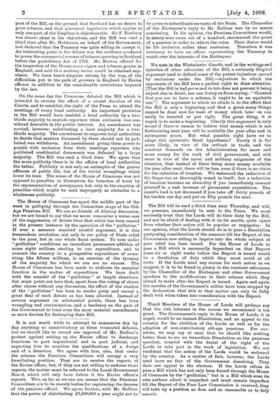It is not worth while to attempt to summarise day
by day anything so unsatisfactory as these truncated debates, but we should like to record our approval of Mr. Balfour's protest against setting up the Excise officer to discharge functions in part inquisitorial and in part judicial, and expecting him to combine the qualifications of a Judge and of a detective. We agree with him, also, that under the scheme the Pensions Committees will occupy a very humiliating position. They are to receive the reports of the Excise officer, but, if they are not willing to endorse those reports, the matter must be referred to the Local Government Board, which will only have before it the Excise officer's reports. This, as far as we can see, means that the Pensions Committees are to be merely bodies for registering the decrees of the pensions official. We agree, further, with Mr. Balfour that the power of distributing £7,500,000 a year ought not to be given to subordinate servants of the State. The Chancellor of the Exchequer's reply to Mr. Balfour was by no means convincing. In his opinion, the Pensions Committees would, in ninety-nine cases out of a hundred, recommend the grant of a pension in order to relieve the rates. Their desire would be for inclusion rather than exclusion. Therefore it was necessary to have an officer representing the Treasury to welch over the interests of the Exchequer.


















































 Previous page
Previous page